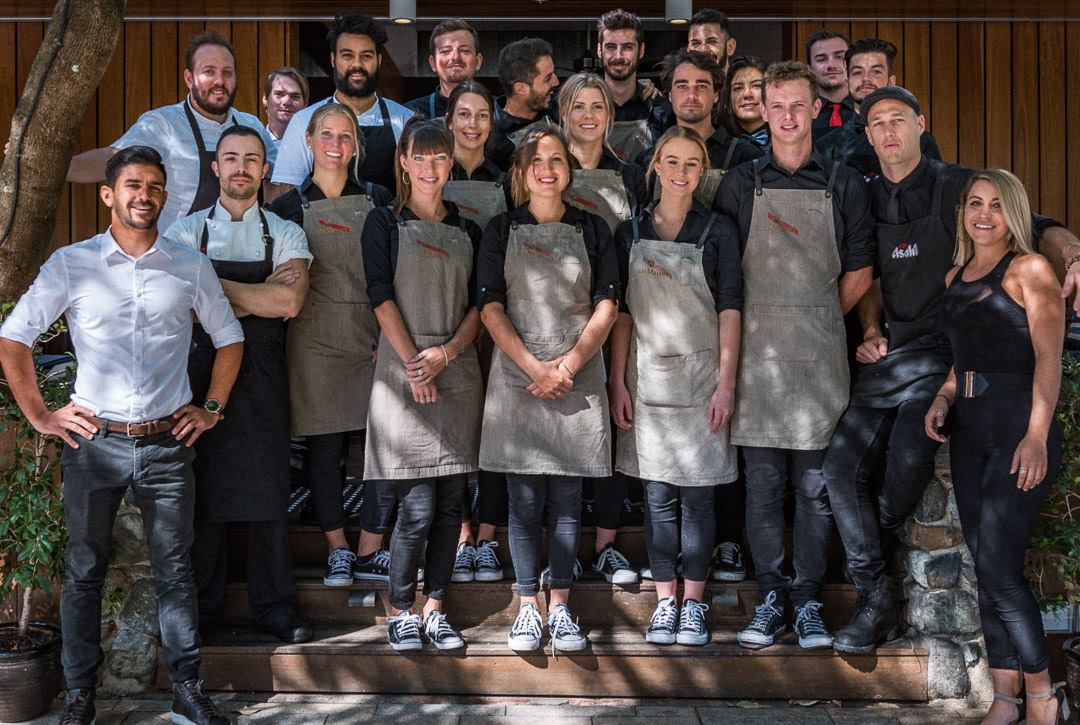The hospitality industry attracts amazing people, but remains an extremely taxing industry with constant high expectations from both employer, colleagues and customers. Having travelled the world experiencing all levels, whether the street Dia Pai Dong in Hong Kong or 6 star hotels, the capacity of staff for Emotional Intelligence shines through more often than not brighter, than the brewing problems internally that sometimes bubble to the surface.
When the modus operandi is to maintain a shift to shift demanding level of consistency & quality surrounded by the offering of a good time, it can be difficult to separate ourselves from it, making poor lifestyle choses. Reflecting back in our personal lives and place of work, this and at times toxic interpersonal interactions can lead to a cycle difficult to break.
Hospitality has beaten all other industries, even construction workers and miners, for substance abuse issues, particularly in bars and restaurants. 80% of male and 64% (2009 figures) of female food service workers engage in risky, potentially harmful patterns of drinking and highest rates of substance use disorders (16.9%), but also the highest rate of past month illicit drug use (19.1%) (2015 figures.
Celebrity chef Anthony Bourdain’s memoirs detailed the “insular and chaotic” kitchens where he plied his trade and fame; these kitchens were typically dangerous and distressing in which to work, in part because of the intense nature of the work, but also because they were “drenched in drugs and alcohol.”

WHAT IT IS?
Mysticism or “I’ve got it under control” misconstrued ideas need to finally be debunked with industry targeted training eventually for every level of staff for organisations that each can relate to.
Do we put out fires or do we train so as to create awareness, provide knowledge and tools for personal growth and ability to recognise and support those around us. Much of about mental health support discussions focuses on direct benefits to solve problems rather than what it can do to preemptively mitigate issues, promote positive behaviours and improve emotional intelligence.
Mental Health First Aid training is more and more commonly available mainly to major corporations. City Mental Health Alliance offers corporate memberships that deliver a multitude of services, thriving at work yearly assessments, 2 day courses delivering “how to” guides, how to become an advocate in the workplace and strategic round tables for board level.
Training is tailored to the audience, whether for a CEO, an apprentice or to specific employee groups both in person or virtual, executive leader masterclass, mental health and wellbeing for people managers, mental health awareness in the workplace, mental health first aid, understand unhealthy perfectionism as well as psychological safety in the work place.
Hospitality Action UK understands the impact on mental health in hospitality, providing fist aid courses with 3 years of support and significant access to resources open to anyone in hospitality.
WHY IT´S COOL?
Proposed is more developed, customised and targeted mental health first aid short courses for the hospitality industry. These can as much be a direct help to individuals with their own struggles but also demonstrating clear indirect benefits, positively impacting the overall emotional intelligence capabilities of staff and customer experience.
- Increased staff morale and engagement When employees receive mental health first aid training, they feel valued and supported by their organisation. This, in turn, boosts their morale and job satisfaction, leading to increased engagement with guests. Happier and more engaged staff members are more likely to provide exceptional customer service, creating a positive experience for guests.
- Improved communication and conflict resolution Mental health first aid training often includes communication and de-escalation techniques. Hospitality professionals who have undergone this training are better equipped to handle difficult situations, including conflicts or challenging interactions with guests. By effectively communicating and managing conflicts, staff can maintain a calm and respectful environment, enhancing the overall customer experience.
- Enhanced problem-solving skills Often involving teaching problem-solving strategies and techniques. Hospitality professionals who receive this training can apply these skills to various situations, including addressing guest concerns or resolving issues promptly and effectively. This proactive problem-solving approach improves the customer experience by ensuring that any challenges are handled efficiently.
- Cultivating a compassionate culture sending a message that the organisation values empathy, compassion, and understanding. This fosters a culture of care and support within the hospitality establishment, which extends to interactions with customers. Guests are more likely to feel comfortable and understood when they encounter staff who are trained to be compassionate and empathetic.
- Positive word-of-mouth and reputation as hospitality businesses demonstrate their commitment to the well-being of both their staff and guests. This dedication to mental health support can generate positive word-of-mouth and enhance the establishment’s reputation. When customers perceive an organisation as caring and empathetic, they are more likely to recommend it to others, leading to increased customer loyalty and satisfaction.
Indirect benefits to training contribute to an improved overall customer experience, by creating an environment where guests feel valued, understood, and well-cared for during their interactions with hospitality professionals. In turn delivering a positive personal experience and career opportunities.
It’s a predictable cycle that is nothing new, “do good and you receive good.”

WHY IT HAS FUTURE GROWTH POTENTIAL?
Specific hospitality tailored mental health first aid courses be made widely available, becoming common place with indirect but consequential benefits alongside mental health apparent to major and smaller organisation.
Once developed these courses are destined to be made systematically available at institutional level, providing training modules starting with anyone in a managerial role. Lead by example. Tickle down affect.
First Aid is mandatory in some industries, this seems improbable in hospitality in the near future but like food safety and risk assessment the net benefits of mental health first aid could be a responsibility worth taking on.
A task and opportunity for educational institutions to collaborate with other professionals and develop 2 day Hospitality Mental Aid First Aid courses into their major subjects.
Attracting a new generation to the hospitality industry, retaining those already in the business, increasing efficiency and revenue for establishments through happier staff and customers as an inevitability.
It sounds too good to be true, but rather than thinking of it as a cure all it is a step up with measurable improvements.
Guy Paillard SUD Professional, Global Strategist & Training Consultant
https://www.ecolinkinstitute.com
Emotional Intelligence in Hospitality
Articles
Mental health & SUD First aide training USA
https://www.speakupreachout.org/training-sessions/mental-health-first-aid-for-hospitality-workers
Substance abuse impairs ability for emotional intelligence
Study on Affects of substance abuse on emotional intelligence
https://premium-papers.com/drug-and-alcohol-effects-on-emotional-intelligence/
Figures
http://Incidence of substance abuse per industry
Hospitality Action – Mental Health Fist Aide Course UK
https://www.hospitalityaction.org.uk/advice/training-on-site-trauma-support/mental-health-first-aid/
Kelly’s Cause – Mental Health Fist Aide Course UK
https://www.kellyscause.com/mission
Emotional Intelligence and Job Performance in the Hospitality Industry
Quote: “dangerous rate of alcohol consumption” of hospitality employees “can lead not only to severe personal health problems including death, but can also cause serious economic harm to the entire hospitality industry” (p. 547). From the point of view of the employer, the hazards of substance use by their employees are manifested as an increased likelihood of workplace accidents and consequent compensation claims, lower productivity, increased absenteeism and a greater staff turnover.



Trevor Henry Yost
Ella Cecilia Rittermeier
Daria Vereschaga
Carl Rohde